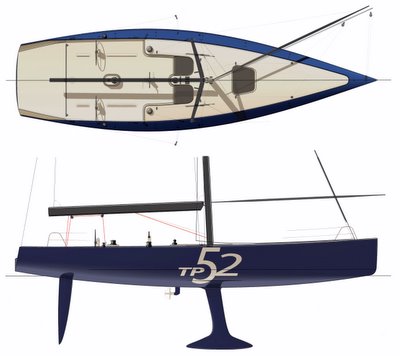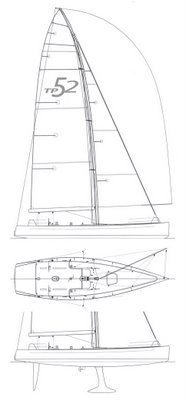The hull shape is flared in order to guarantee a reduced entry semi-angle, a high dynamic stability and a lesser width of flotation.
The prismatic coefficient is under the highest values admitted, which allows good performance in sailing up-wind with light conditions and gives the hull the necessary power in sailing down-wind.

The keel and the rudder have the maximum draught allowed by the rules.
They both present thin sections and particular configurations.
The rudder is very deep and is placed in advanced position.
The keel presents hydrodynamic sections which continue over the bulb profile with an inverted profile towards the bow in order to support the centering between the sail plan and the centre of gravity setting.

The sail plan is very innovative compared to the traditional Transpac configurations.
As a matter of fact the carbon mast is preformed in order to obtain the roach of the main on the luff entry instead of the leech.
In this way the leech line is almost straight and vertical and its surface is optimized on the points of measuring in accordance with TP 52 rules.
Besides the accentuated rake of the mast enables the gennaker to expose the maximum surface and have a bigger luff entry length.
Concerning spreaders, they are as wide as possible to guarantee the mast profile stability, while the jumper, placed at the top of the mast, controls the flexion and the main twist, to open the leech and de-power the main sail.
The deck is very linear and functional and related to the particular structural solutions.
The deck is restricted and self-supporting thanks to the lentiform bottom and the longitudinal grooves of the stretcher from stem to stern.
There is only one coffee grinder which serves both the principals and the boom sheet.
The same attention has been dedicated to the ergonomic details, by studying the manoeuvres concerning hoisting, lowering and handling of the wide gennakers.
The interiors arrangement follows the natural evolution of the structural lines of the boat according to the TP 52 Class rules.

Tecnical Spcifications
Lft: 15.83 m
Lwl: 14.10 m
Bmax: 4.35 m
Displ: 7500 kg
Draft: 3.20 m
P: 20.42 m
E: 6.50 m
I: 19.05 m
J: 6.17 m
Main: 91 m²
Jib: 61 m²
Gennaker: 247 m²
Hull
Glass-Carbon-Kevlar composite
Sandwich 30 mm Airex
SP resin Epoxy
Lamination with vacuum system and post-cure
Deck
Glass-Kevlar composite
Sandwich 30 mm Airex
SP resin Epoxy
Lamination with vacuum and post-cure
Keel
Structure in Veldox
Bulb in Lead and Antimony
Rudder
Composite carbon structure
Crash-box system
Equipped Lewmar
Mast
Mast, boom and gennaker pole in Hall Spars carbon
Standing rig in discontinuous Nitronic 50 rod
Deck equipment
Complete Harken system
Hatches and port-lights custom
Accessories Spinlock and Wichard
Engine
Inboard Yanmar 4JH2CE SD31 51 hp Sail Drive
Gori Racing Two-blade screw
Electronics
Complete B&G system
The prismatic coefficient is under the highest values admitted, which allows good performance in sailing up-wind with light conditions and gives the hull the necessary power in sailing down-wind.

The keel and the rudder have the maximum draught allowed by the rules.
They both present thin sections and particular configurations.
The rudder is very deep and is placed in advanced position.
The keel presents hydrodynamic sections which continue over the bulb profile with an inverted profile towards the bow in order to support the centering between the sail plan and the centre of gravity setting.

The sail plan is very innovative compared to the traditional Transpac configurations.
As a matter of fact the carbon mast is preformed in order to obtain the roach of the main on the luff entry instead of the leech.
In this way the leech line is almost straight and vertical and its surface is optimized on the points of measuring in accordance with TP 52 rules.
Besides the accentuated rake of the mast enables the gennaker to expose the maximum surface and have a bigger luff entry length.
Concerning spreaders, they are as wide as possible to guarantee the mast profile stability, while the jumper, placed at the top of the mast, controls the flexion and the main twist, to open the leech and de-power the main sail.
The deck is very linear and functional and related to the particular structural solutions.
The deck is restricted and self-supporting thanks to the lentiform bottom and the longitudinal grooves of the stretcher from stem to stern.
There is only one coffee grinder which serves both the principals and the boom sheet.
The same attention has been dedicated to the ergonomic details, by studying the manoeuvres concerning hoisting, lowering and handling of the wide gennakers.
The interiors arrangement follows the natural evolution of the structural lines of the boat according to the TP 52 Class rules.

Tecnical Spcifications
Lft: 15.83 m
Lwl: 14.10 m
Bmax: 4.35 m
Displ: 7500 kg
Draft: 3.20 m
P: 20.42 m
E: 6.50 m
I: 19.05 m
J: 6.17 m
Main: 91 m²
Jib: 61 m²
Gennaker: 247 m²
Hull
Glass-Carbon-Kevlar composite
Sandwich 30 mm Airex
SP resin Epoxy
Lamination with vacuum system and post-cure
Deck
Glass-Kevlar composite
Sandwich 30 mm Airex
SP resin Epoxy
Lamination with vacuum and post-cure
Keel
Structure in Veldox
Bulb in Lead and Antimony
Rudder
Composite carbon structure
Crash-box system
Equipped Lewmar
Mast
Mast, boom and gennaker pole in Hall Spars carbon
Standing rig in discontinuous Nitronic 50 rod
Deck equipment
Complete Harken system
Hatches and port-lights custom
Accessories Spinlock and Wichard
Engine
Inboard Yanmar 4JH2CE SD31 51 hp Sail Drive
Gori Racing Two-blade screw
Electronics
Complete B&G system
________________________________
PYD Picco Yacht Design
c.so Milano, 156 37138 Verona – Italy
+39 045 810.41.46
info@piccoyachtdesign.com
www.piccoyachtdesign.com